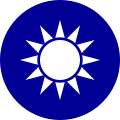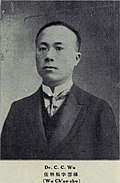| President of the Judicial Yuan | |
|---|---|
| Nominator | President |
| Appointer | Legislative Yuan |
| Term length | 8 years |
| Inaugural holder | Wang Chong-hui |
| Formation | 1928 |
| Website | www.judicial.gov.tw |
This is a list of presidents of the Judicial Yuan of the Republic of China. [1] This position is also called the chief justice since the 4th constitutional amendment in 1997, which mandated that the position holder shall also be a justice in the Constitutional Court. [2]
Contents
- List
- Before 1947 Constitution
- Post-1947 Constitution
- Post-1947 Constitution (1997 Constitution amendment)
- Timeline
- References
| This article is part of a series on |
 |
|---|

















